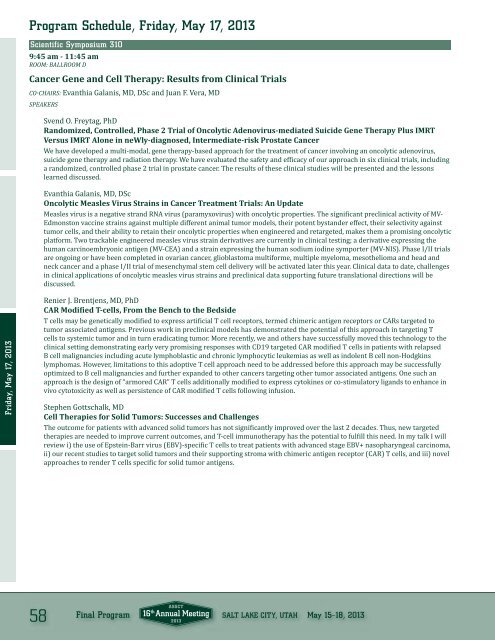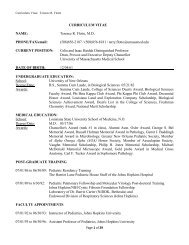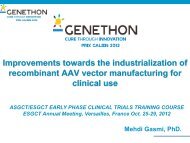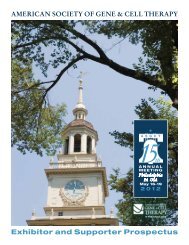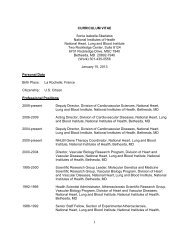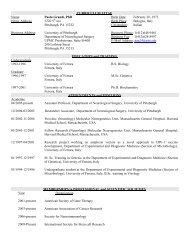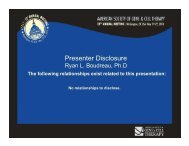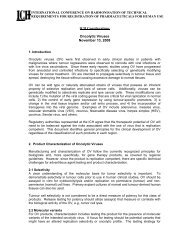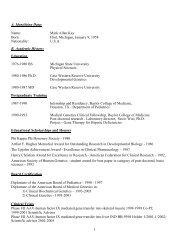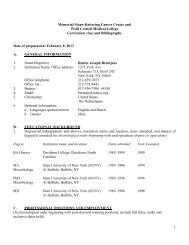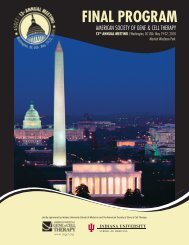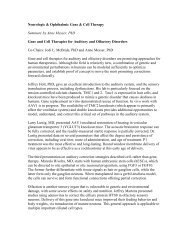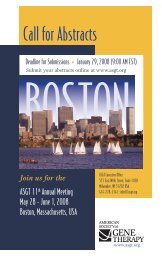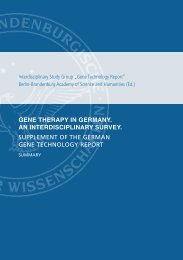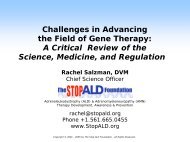Final Program - American Society of Gene & Cell Therapy
Final Program - American Society of Gene & Cell Therapy
Final Program - American Society of Gene & Cell Therapy
Create successful ePaper yourself
Turn your PDF publications into a flip-book with our unique Google optimized e-Paper software.
<strong>Program</strong> Schedule, Friday, May 17, 2013<br />
Scientific Symposium 310<br />
9:45 am - 11:45 am<br />
ROOM: BALLROOM D<br />
Cancer <strong>Gene</strong> and <strong>Cell</strong> <strong>Therapy</strong>: Results from Clinical Trials<br />
CO-CHAIRS: Evanthia Galanis, MD, DSc and Juan F. Vera, MD<br />
SPEAKERS<br />
Svend O. Freytag, PhD<br />
Randomized, Controlled, Phase 2 Trial <strong>of</strong> Oncolytic Adenovirus-mediated Suicide <strong>Gene</strong> <strong>Therapy</strong> Plus IMRT<br />
Versus IMRT Alone in neWly-diagnosed, Intermediate-risk Prostate Cancer<br />
We have developed a multi-modal, gene therapy-based approach for the treatment <strong>of</strong> cancer involving an oncolytic adenovirus,<br />
suicide gene therapy and radiation therapy. We have evaluated the safety and eficacy <strong>of</strong> our approach in six clinical trials, including<br />
a randomized, controlled phase 2 trial in prostate cancer. The results <strong>of</strong> these clinical studies will be presented and the lessons<br />
learned discussed.<br />
Evanthia Galanis, MD, DSc<br />
Oncolytic Measles Virus Strains in Cancer Treatment Trials: An Update<br />
Measles virus is a negative strand RNA virus (paramyxovirus) with oncolytic properties. The signiicant preclinical activity <strong>of</strong> MV-<br />
Edmonston vaccine strains against multiple different animal tumor models, their potent bystander effect, their selectivity against<br />
tumor cells, and their ability to retain their oncolytic properties when engineered and retargeted, makes them a promising oncolytic<br />
platform. Two trackable engineered measles virus strain derivatives are currently in clinical testing; a derivative expressing the<br />
human carcinoembryonic antigen (MV-CEA) and a strain expressing the human sodium iodine symporter (MV-NIS). Phase I/II trials<br />
are ongoing or have been completed in ovarian cancer, glioblastoma multiforme, multiple myeloma, mesothelioma and head and<br />
neck cancer and a phase I/II trial <strong>of</strong> mesenchymal stem cell delivery will be activated later this year. Clinical data to date, challenges<br />
in clinical applications <strong>of</strong> oncolytic measles virus strains and preclinical data supporting future translational directions will be<br />
discussed.<br />
Friday, May 17, 2013<br />
Renier J. Brentjens, MD, PhD<br />
CAR Modiied T-cells, From the Bench to the Bedside<br />
T cells may be genetically modiied to express artiicial T cell receptors, termed chimeric antigen receptors or CARs targeted to<br />
tumor associated antigens. Previous work in preclinical models has demonstrated the potential <strong>of</strong> this approach in targeting T<br />
cells to systemic tumor and in turn eradicating tumor. More recently, we and others have successfully moved this technology to the<br />
clinical setting demonstrating early very promising responses with CD19 targeted CAR modiied T cells in patients with relapsed<br />
B cell malignancies including acute lymphoblastic and chronic lymphocytic leukemias as well as indolent B cell non-Hodgkins<br />
lymphomas. However, limitations to this adoptive T cell approach need to be addressed before this approach may be successfully<br />
optimized to B cell malignancies and further expanded to other cancers targeting other tumor associated antigens. One such an<br />
approach is the design <strong>of</strong> “armored CAR” T cells additionally modiied to express cytokines or co-stimulatory ligands to enhance in<br />
vivo cytotoxicity as well as persistence <strong>of</strong> CAR modiied T cells following infusion.<br />
Stephen Gottschalk, MD<br />
<strong>Cell</strong> Therapies for Solid Tumors: Successes and Challenges<br />
The outcome for patients with advanced solid tumors has not signiicantly improved over the last 2 decades. Thus, new targeted<br />
therapies are needed to improve current outcomes, and T-cell immunotherapy has the potential to fulill this need. In my talk I will<br />
review i) the use <strong>of</strong> Epstein-Barr virus (EBV)-speciic T cells to treat patients with advanced stage EBV+ nasopharyngeal carcinoma,<br />
ii) our recent studies to target solid tumors and their supporting stroma with chimeric antigen receptor (CAR) T cells, and iii) novel<br />
approaches to render T cells speciic for solid tumor antigens.<br />
58<br />
<strong>Final</strong> <strong>Program</strong> SALT LAKE CITY, UTAH May 15–18, 2013


